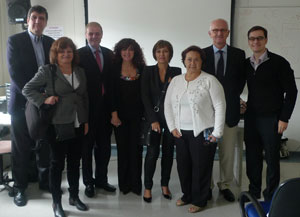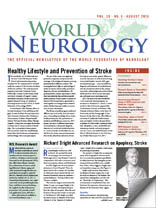In order to promote neurosonology in Latin America, considerable efforts of the Neurosonology Research Group (NSRG) of the WFN have been undertaken during the last two years to establish a Latin American Chapter. The nucleus of the new chapter is spearheaded by a group of Brazilian Neurosonologists chaired by Viviane F. Zetola, MD, PhD, who organized a sonography workshop in October 2012 in Sao Paolo.
For the first time, there also was an opportunity for advanced participants to take part in a practical and theoretical examination according to the regulations of the NSRG. Twenty-three individuals finally passed the challenging certification procedure and received the NSRG document.

Faculty of recent NSRG teaching course in Sao Paulo: (from left) Ayrton Massaro (Brazil), Corina Puppo (Uruguay), Natan Bornstein (Israel), Silvia Cocorullo (Argentina), Viviane Flumignan Zétola (Brazil), Glória Meza Rejas (Paraguay), Manfred Kaps (Germany) and Marcos Lange (Brazil).
The Latin American chapter of neurosonology recently initiated a task force against Sickle Cell Anemia (SCA) in which transcranial ultrasound (TCD) is used to identify SCA patients in need of transfusion therapy in order to prevent stroke. Twenty-two neurologists participated in this pilot project and identified 13 percent of 56 cases examined during one day, carrying increased risk of stroke. The project proved efficient and will be implemented in areas with high prevalence of SCD in Brazil during the next years.
In 1992, transcranial Doppler was introduced in Brazil; neurologists now aim to expand their diagnostic scope to the extracranial brain supplying arteries, which are actually mainly in the hands of non-stroke physicians. Therefore, the priority of the Latin American chapter will focus on education and on implementation of neurosonology in stroke care programs.
“We are looking for partners throughout Latin America to cooperate and to grow. Our chapter welcomes all physicians and investigators practicing neurosonology or that are willing to enter this field,” said Zetola, professor of Federal University of Parana (Brazil). The next opportunity to meet members of the Latin American chapter will be during the 16th World Neurosonology Meeting October 2013 in Sofia, Bulgaria (www.nsrg2013.net), or the Brazilian Congress of Cerebrovascular Diseases Nov. 13-16 in Fortaleza.
Kaps is chairman of the Neurosonology Research Group.
